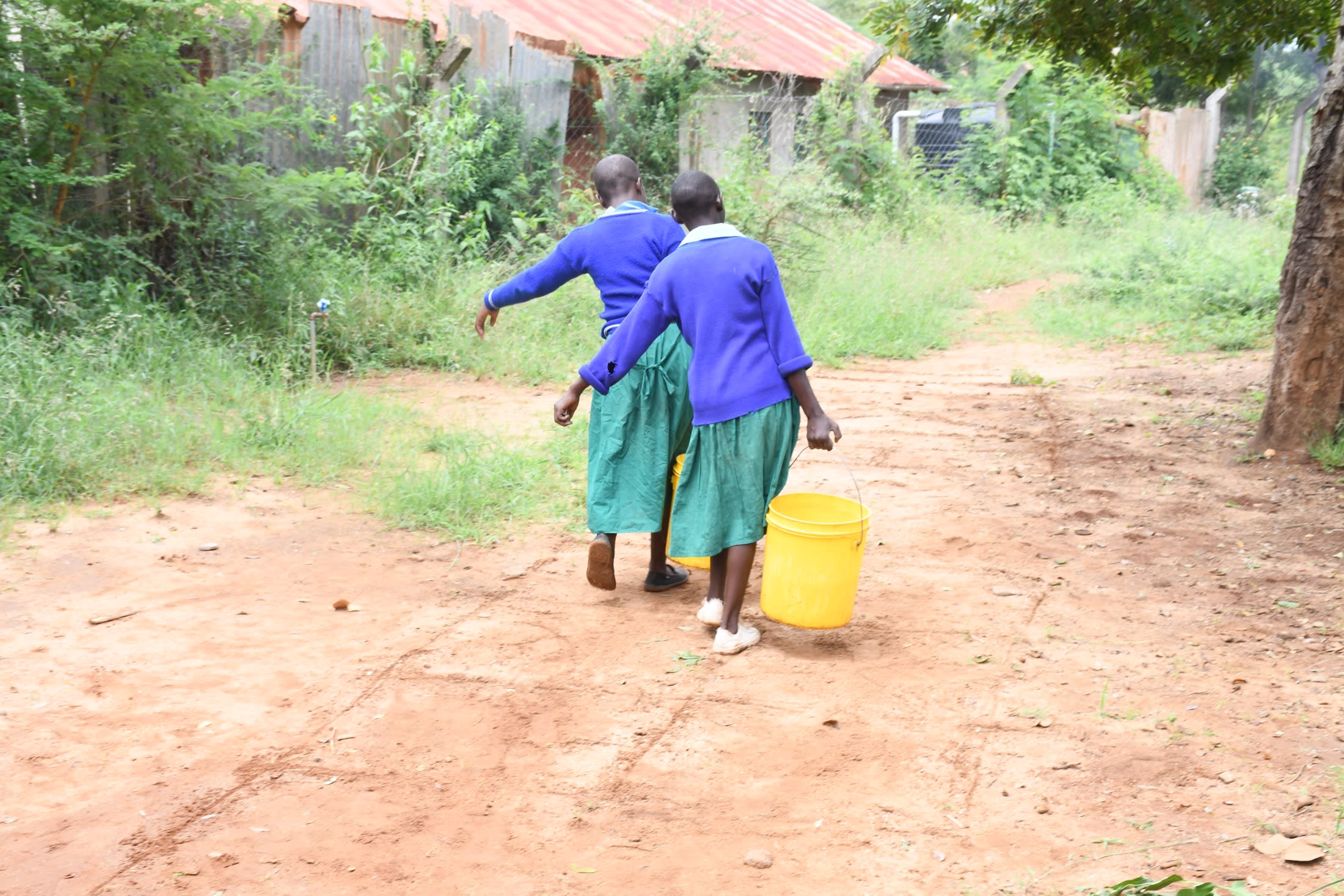February, 2022: Migwani DEB Primary School Rain Tank Complete!
Migwani DEB Primary School in Kenya now has access to a new source of safe, clean water thanks to the completion of their rain tank, which can collect 104,000 liters of water. In addition, we installed handwashing stations, and we trained students and staff on improved sanitation and hygiene practices. These components work together to unlock the opportunity for these students to live better, healthier lives.

12-year-old Daniel explained how the water tank will improve his life. "My academic performance will soar higher because I can easily drink clean water from this water point during exams and classes, unlike before [when] there was no water within the school, and the little we had [was] stored in plastic jerry cans that were open to contamination. We will also be able to improve our school's hygiene and sanitation."
Teacher Magdalene Muli, 46, is excited for a better working environment. "I will be more comfortable teaching pupils in a clean class. My pupils will also have enough clean water to drink which enables comfort during learning since they are more attentive and not being distracted by the need to quench their thirst. With the improved hygiene and sanitation, my pupils will no longer be sick and absent from school."

Thumbs up!
The tank also opens up new opportunities for the school itself. "The school will be able to set up a feeding a program thanks to the implemented water point," Magdalene continued.
"We will also be able to improve the green scenery within the school because we will use the water to irrigate the tree seedlings," Daniel added.
"The school also plans to cultivate trees and vegetables like kales and spinach," said Magdalene.
The pupils and the entire school population were elated about the project and were grateful to everyone who helped implement the school water tank. They expect hygiene and sanitation to improve and absenteeism to reduce, which will improve the school's academic performance.
Rain Tank Construction Process
First, we held a meeting with all parents and the school Head Teacher to plan the project. The parents agreed to collect construction materials like sand, rocks, and water. We would complement their materials by delivering the expertise, tools, lumber, metal, cement, and gutter system.

This tank is a whopping 104,000 liters because of a large student population and how rarely it rains in Southeastern Kenya. Therefore, the more water the tank can store during the seasonal rains, the more water will be available through the dry months for the students.
Construction for this large rain tank is much like the construction of a concrete house. First, we leveled the ground for foundation excavation. Next, we laid alternating layers of impermeable rocks and mortar up to 7 feet high, with internal and external diameters of 25 and 28 feet, respectively.

We built a reinforced concrete column right up to the tank’s center, which holds up the roof and prevents it from caving in. We then plastered the walls both internally and externally with waterproof cement. After that, we installed several feet of guttering and channeled them into the tank. Finally, we installed the roofing, made of iron sheets and timber with vents to allow rainwater into the tank from the gutters.

Completed gutters.
School leadership is armed with the technical skills to ensure that the water tank remains functional, and together we will identify gaps through our ongoing monitoring visits.

Handwashing Stations

We delivered three new handwashing stations in time for training to be used for handwashing demonstrations. Each of these new stations has three taps so that nine students can wash their hands simultaneously.
New Knowledge
We trained on a variety of health, hygiene, and sanitation topics. These included student health club activities, disease transmission and prevention, personal hygiene, handwashing, water hygiene, food hygiene, latrine hygiene, and soapmaking.

289 pupils and 11 teachers attended the training, with no student absences - an excellent turnout!
Students were most interested to learn about COVID-19 and clear up any misconceptions they had learned. The facilitators explained that COVID is transmitted through particles in the air we cannot see, which is why physical distancing and mask-wearing are both important.
"I will share this new insight with my parents and siblings to help them prevent the spread of COVID-19," said 14-year-old Ann M. "I also learned about contactless greeting, social distancing, and why we should avoid overcrowded places. Therefore, I will be able to remain healthy and focus on my studies. That will place me in better career opportunities."

Learning how to make soap.
The students had the most fun learning about fecal-to-oral disease transmission, during which a few pupils were picked to perform a roleplay. The girl who performed as the mother character did so with passion, confidence, and motherly energy. One of the teachers asked the girl what made her perform so well, and the girl said she was emulating her own mother.
"We will train our guardians on the importance of hygiene," said 14-year-old Peter M. "That way, incidences of diseases will reduce. Personally, I have learned and understood that most diseases are related to hygiene and behavior. If we improve our daily behaviors and adhere to what has been trained, we will be on the safe side."

Peter at the training.
When an issue arises concerning the rain tank, the students and teachers are equipped with the necessary skills to rectify the problem and ensure the water point works appropriately. However, if the issue is beyond their capabilities, they can contact our field officers to assist them. Also, we will continue to offer them unmatchable support as a part of our ongoing monitoring and maintenance program.
Thank you for making all of this possible!



 Rainwater Catchment
Rainwater Catchment
 Rehabilitation Project
Rehabilitation Project

































